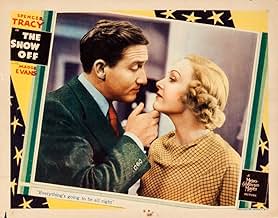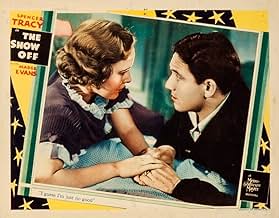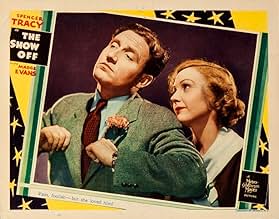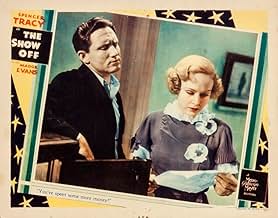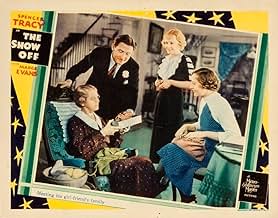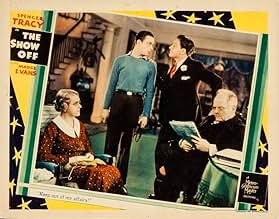Aubrey cons Amy into thinking he's a railroad bigwig. After they marry Aubrey overspends in setting up their home. When their financial situation gets dire they go back to her parents house ... Read allAubrey cons Amy into thinking he's a railroad bigwig. After they marry Aubrey overspends in setting up their home. When their financial situation gets dire they go back to her parents house until Aubrey changes his ways and they can get on stable footing. When he loses his job he... Read allAubrey cons Amy into thinking he's a railroad bigwig. After they marry Aubrey overspends in setting up their home. When their financial situation gets dire they go back to her parents house until Aubrey changes his ways and they can get on stable footing. When he loses his job he takes one wearing a sandwich board. After he helps Joe sell his patent for a good price a... Read all
- Director
- Writers
- Stars
- Awards
- 1 win total
- Jimmy
- (uncredited)
- Andrew Barnabas
- (uncredited)
- Mrs. John Preston
- (uncredited)
- Excursion Boat Passenger
- (uncredited)
- Elevator Operator
- (uncredited)
- Ship #1 Officer
- (uncredited)
- Perry
- (uncredited)
- Automobile Attendant
- (uncredited)
- 2nd Drunk
- (uncredited)
- Mr. Weitzenkorn
- (uncredited)
- Director
- Writers
- All cast & crew
- Production, box office & more at IMDbPro
Featured reviews
J. Aubrey Piper is a lowly railroad office employee who freely gives vent to all who will listen or are in ear shot to his delusions of grandeur. After inadvertently becoming a hero by falling off a boat to save a drowning man he hooks up with Amy Fisher (Madge Evans) who believes in him even if her family (and you can't blame them) doesn't. J. Aubrey continues to make a mess of things though and loses his job and Amy leaves him while J A is now reduced to wearing a sandwich board advertising turkey dinners.
Tracy's Piper possesses a huge ego that fails to see the error of his ways in the most glaring of circumstances. He's so abrasive, annoying and audacious at times that you just want someone to slap some sense into him. Spence goes a little over the top at times but it's when chastened and free of mania that we see the performer that would go on to be as respected as any film actor of his era bring the audience to his side. The prolific Clara Blandick (she'd appear in 10 films in 1934) as the disapproving mother provides a perfect foil for Piper with cutting one liners and withering facial expressions.
Overall The Show-Off is a mild comedy with a thin story line but it does offer an energetic performance from Spencer Tracy seldom seen in a man with the cinema gravitas of Mount Rushmore.
J. Aubrey Piper (Spencer Tracy) is an office clerk working for a railroad and out on an excursion boat when a man falls overboard. Piper jumps in and saves the man, winning the attention and interest of Amy Fisher (Madge Evans), the daughter in a respectable middle-class family. Aubrey is a bag of wind like the biggest hurricane you've ever seen, but Amy oddly seems blinded to all of this blustering. She doesn't seem to notice that although Aubrey always takes her out in the most fashionable of cars that it's always a different one every time - a "demonstration model". This was a custom years ago of letting people with no credit history drive new expensive cars around to see if they liked them enough to buy them. The problem is, the rest of Amy's family knows exactly what Aubrey is and they cringe every time he comes around, always with a big appetite and a tale overblowing his own importance.
Amy and Aubrey get married, and soon the problems begin. Amy's problem is not suddenly discovering that her husband is a liar, because he really isn't. He doesn't lie about his occupation or income, he just blows out of proportion his own importance in every event that occurs. Thus the death of their marriage is slow suffocation from a thousand disappointments - things bought on credit when Amy thought they were paid for, bills unpaid, wage attachments - all because Aubrey really believes his ship is about to come in although he has no plan as to how and why.
This one ends in a way that you wouldn't expect for an MGM movie in the 1930's that seems to be teaching a tale about the need for humility and realism, and maybe that was because in 1934 the last things Americans needed in the Great Depression was humility and realism in what is supposed to be a comedy.
I'd recommend this one as an opportunity to see Spencer Tracy early in his career in a very likable little film. In the hands of a lesser actor you'd probably just want to strangle Piper, but Tracy gives even this shallow fellow enough depth that you'll likely feel at least a little sympathy for him at points. I know I did.
Piper continually lies to make himself look bigger in other people's eyes but really succeeds only in making himself feel better. They nearly always disbelieve and ridicule him. (The exception being his fiancee, then wife, Madge Evans, who romanticises him and finds out her mistake only after marriage.) True, the wife eventually tells him that he is not a man, and his mother-in-law, Clara Blandick, the sourball to end all sourballs, is always sending hilariously scornful put-downs his way. But on the whole the movie regards Piper with tolerant affection.
But if we look at Piper seriously, what is he? A man who causes his wife worry and distress so that he can sustain the fiction of wealth and generosity. A man to whom other people are no more than an audience. One might affectionately tolerate a six-year-old who carried on as Aubrey does, but the way this man ignores reality and people's feelings make him more of a psychopath than a show-off.
What is ironic is that Kelly in fact had got hold of one of the big changes in American life but came at it from the wrong angle. The Twenties was when promotion began to be a powerful force, when fast talk and ballyhoo triumphed over sober reality, and advertisers learned to sell not the steak but the sizzle. But this idea is conveyed far better by characters such as Lee Tracy and James Cagney, who gleefully carried off stunning feats of well-plotted chicanery. Aubrey Piper, on the other hand, with his inept schoolboy antics, grinning and patting himself on the back, is just a loudmouth amateur.
One reviewer has mentioned that this characterisation is a big change from Spencer Tracy's usual solemnity. If you want to see a manic Tracy whom you can regard with affection, look for The Actress, Ruth Gordon's story of her early years. He plays her manic and utterly lovable papa.
Watching The Show-Off today I thought of two early television characters that Tracy reminded me of. A little bit of Phil Silvers as Sergeant Bilko and a whole lot of Jackie Gleason as Ralph Kramden.
The film is of course based on George Kelly's play of the same name and in doing a little research on Kelly I found there was a live production on television in the Fifties that starred none other than Jackie Gleason. Red Skelton did a remake of this as a feature film, but I hope that Gleason's performance is not lost and a kinescope of the performance exists and is preserved.
Tracy's a lovable mug with a gift for gab who like Ralph Kramden had every big scheme blow up in his face. And he's got his Alice here in the person of Madge Evans who Audrey Meadows could have played in a remake. Tracy's not a womanizer here, he really does love Madge and she him. But Madge is about at her wit's end with him.
During the course of things they have to move back with her mother. You remember Ralph's mother-in-law? Clara Blandick almost steals the film as Madge's mom who cannot stand her son-in-law. Like Bilko and Ralph he's always "on" all the time. I know I couldn't stand living with someone like that.
Tracy gives it a good try and the cast does well. But maybe the film needed a Norton character.
As someone who grew up with that clash - though it was Puritan vs. Italian-Catholic, with the Irish as referrees, I loved this movie. The Puritans were so perfectly portrayed, and WHO CAN CRITICIZE Clara Blandick? If she isn't waving the "white" flag better than anyone for our culture going down in all its glory - as the WASP business class did in the 1930s, then I don't know who..
Clara is superb and her character pegs Tracy for the blowhard that he is. But he is more than a blowhard - he is genuinely tender with Madge, and his love for her - albeit the puppy love of a couple in their 20s - is real and sincere.
Clara reminded me of a maternal grandmother - granted, grandma, born Charlotte Evelyn Hemmings, was on the serious narcotic known as Roman Catholicsm by the time I knew her (having converted 20 years before I was born), and to a lesser extent, my dear mother, gone these three years, who not only was on Roman Catholicism, but also on real narcotics after having Irish triplets, courtesy of the Latino known as Daddio.
Anyway, I love these portrayals of Yankee/Puritan/WASP womanhood (don't all happy people love their mothers?) - both Clara and Madge are honest to the core - and like Kay Johnson in Passion Flower - they are willing to accept the "other" - in this case the new blood that is Spencer Tracy - daughter lovingly, mother grudgingly.
No coincidence that Kay Francis is the femme fatale in Passion Flower - like Tracy she was culturally Irish, right down to the convent schools (when Ma could afford them).
So watch this movie as a culture class and enjoy it. The Irish had a few things to teach the white people...
Did you know
- TriviaThe part of J. Aubrey Piper was originally to be played by Lee Tracy, but his contract was terminated by MGM when, during the production in Mexico of Viva Villa! (1934), he got drunk, urinated off a balcony onto a passing patrol of Mexican soldiers (who almost shot him) and was deported from Mexico. Spencer Tracy got the part with the help of Frank Morgan, and afterwards signed a long-term contract with MGM.
- GoofsThe contract that Aubrey signs, with such extraordinary consequences, would not be binding because he had been given no authority by the company to make it.
- ConnectionsReferences Poor Aubrey (1930)
- SoundtracksHappy Days Are Here Again
(uncredited)
Written by Milton Ager and Jack Yellen
Whistled by Spencer Tracy
Details
- Runtime
- 1h 17m(77 min)
- Color
- Aspect ratio
- 1.37 : 1

